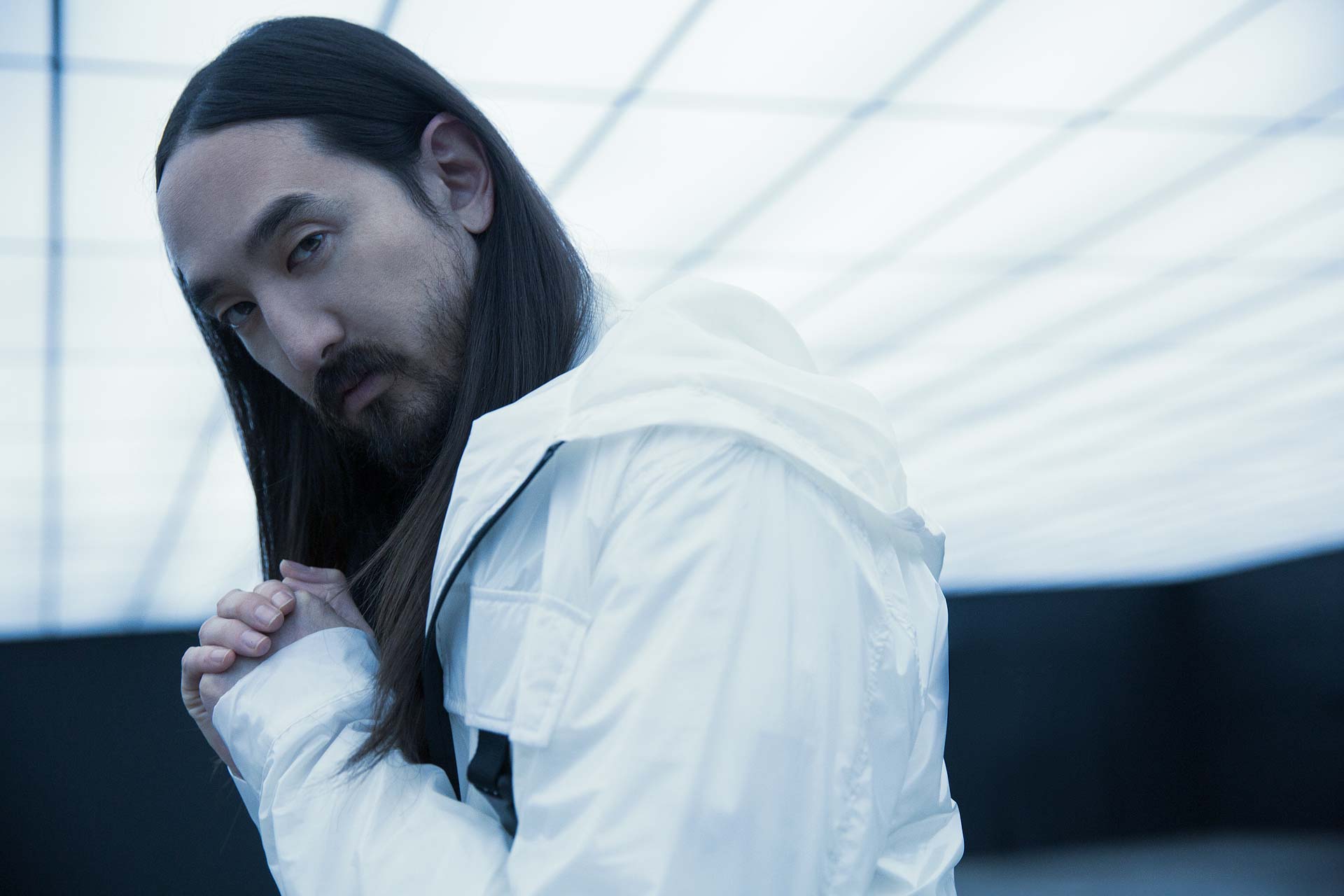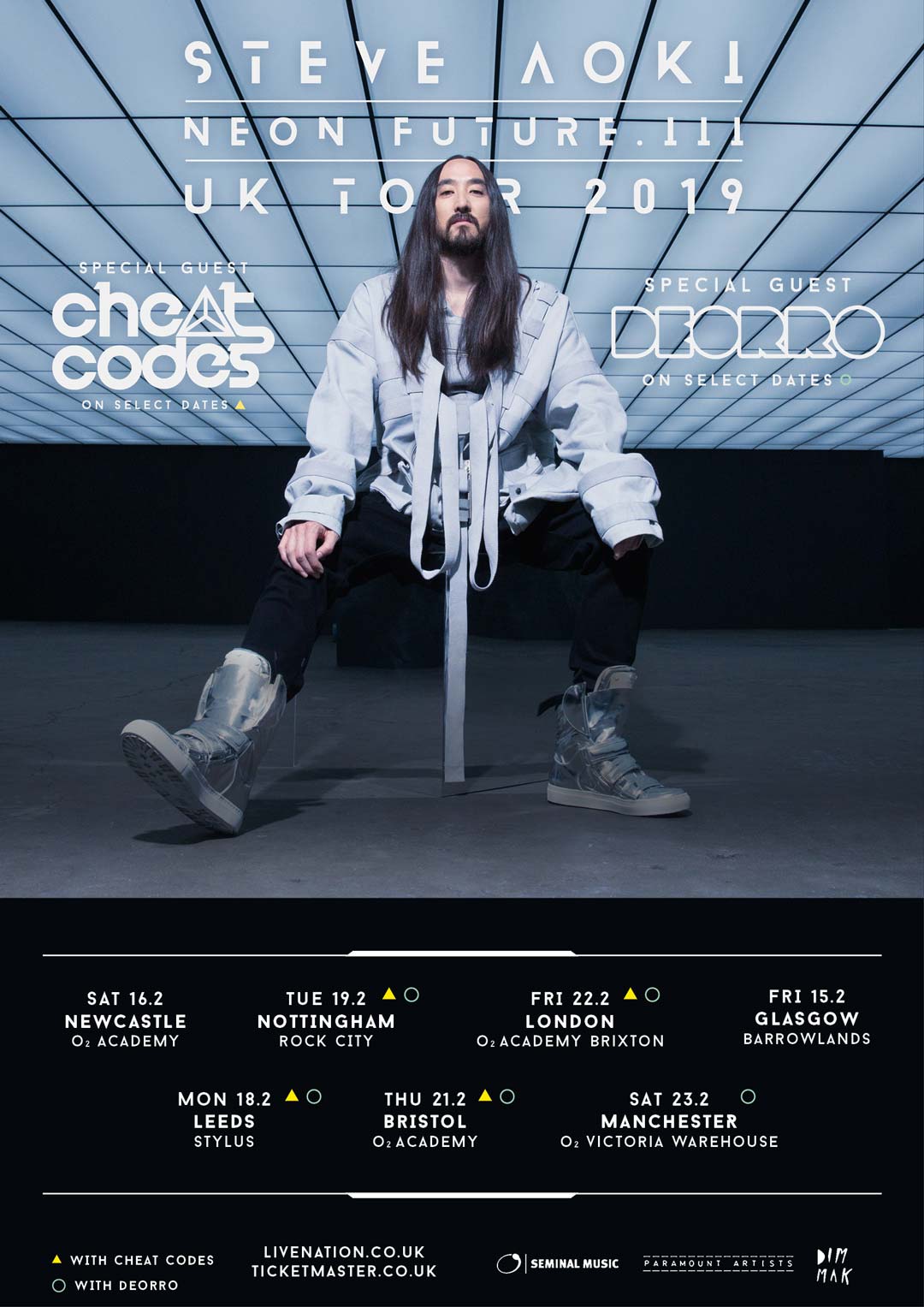Steve Aoki’s Neon Future III tour boots up

The first time I ever heard Steve Aoki’s music it was 2013, about two in the afternoon, at London’s SW4 festival. Midway through his sunstroked mainstage set, I experienced a couple of other firsts in quick succession; first time getting hit in the chest by chocolate cake (thrown by the man himself), and first time kissing someone nearly twice my age. As the day rolled on, I watched Pitchfork-approved sets by artists like Totally Enormous Extinct Dinosaurs and Rustie but didn’t find any crowds as diverse or joyous as Aoki’s.
In the past five years, as Aoki has sharpened his signature immediate, hook-heavy EDM through three ‘Neon Future’ albums, the motivations behind the music have developed and intensified. His father, a Japanese Olympian wrestler and self-made restaurant-owning émigré in New York, passed away, giving a new poignancy to Aoki’s dreaming and – via scientific research – funding of a future without death by old age. In a time when EDM represents an escape for millions of young Americans in a time of deep fear and social upheaval, Aoki confronts dancers directly with messages of hope and acceptance.
My favourite track on Neon Future III is ‘Pretender’. Whilst it’s not the biggest banger on the album, it has a lovely emotional message revealing the insecurities behind those who seem confident, I can really imagine it making a difference to people and changing their perspectives. How did it come about?
Pretender was lyrically written by AJR and Lil Yachty, AJR gave me the song quite a while ago, and I knew it was going to have cultural relevance because our generation, we show ourselves online. You know, the best songs, the best comedy, come from social critiquing, and I thought it was strange that there hasn’t really been a big song talking about that, because it’s endemic in our culture, in Western culture. Everyone that has social media can relate to it and know that they’re caught up in this same thing. I’m really proud of that song, and I really took my time on the production to get it just right.
I really appreciated Lil Yachty’s presence, as he’s someone who gets through to loads of people who struggle with hip hop, because of the pretty egoless way he puts himself out there. Why did you choose to record with him?
He was on a song on my last album, he’s a good friend, and so when I was passing through Atlanta, which is such a cultural hub, particularly for American culture and pop music, whenever I’m there I’m always renting studios and working as much as possible. So we were already doing a shoot together for our last track, and I told him ‘I have a song that I really really need you on, I know you’d get it’, I FaceTimed him a million times like ‘you’ve gotta come over here’. He loved the lyrics and the melody, and got in the booth pretty quickly and knocked his verse out, he didn’t even write any lyrics down, he just told his own story, which is why he’s such a great artist; he’s a storyteller.
Something I have in common with you is that I grew up in a similar situation to you, I moved to England when I was 11, was a heavily bullied outcast at school, and at that time I really loved marvel comic books. As I became a bit more socially aware I got into music, which really helped me make friends – whereas Marvel was just for me alone. What I find funny now is that Marvel has now become something so commercially massive that I can use it to connect to people I wouldn’t otherwise be able to talk to. Do you feel like that with dance music, that you want to help nerds connect with bros, for example, as your music connects with a lot of different people?
Yeah I mean what I do now is actually the opposite of what I used to do when I was a kid I was into the punk hardcore scene, that’s very exclusive, and there’s nothing wrong with that, it can be really empowering in helping you find a voice. EDM is all about inclusivity, everyone’s invited.
I was recently listening to the Nerdist interview with John Boyega, and he said that he loves the Avengers because of the timely theme of all these different heroes joining for a common cause. Has the way you see your duties in music changed because of what’s been happening in America?
It’s definitely a message that we need now, to unite together, one fight one people. But regardless of what’s happening in the United States administration, I’m always an artist that reaches for the boundaries, I prefer to be uncomfortable and challenge myself, and work with people from different worlds and cultures, as much as it’s natural to work within your boundaries, I do work a lot inside my box too, but I feel like you’re always more powerful when you challenge yourself.
You’ve collaborated with everyone from rappers in Atlanta to scientists and directors like Bill Nye and J.J. Abrams. Were there any people with whom you found a connection difficult?
I wouldn’t say difficult, some collaborations just take time. When I was doing something with Machine Gun Kelly, I sent him a track and he was like nah, let me get in the studio with you, and we basically started from scratch; I wrote some music while he was in the booth, he was like producing it along with. So you know, there are lot artists I work with who are very hands on like that, he’s the guy who’s very much like ‘I wanna hear all the details, I wanna go in with you’, Quavo is like that too. But like I don’t wanna categorise him as a difficult artist, he’s someone who works intuitively in the studio with you like I’m not really answering your question because I don’t really have anyone who’s difficult, I’ve rephrased it and made it about what took longer than expected.
I love it when people I’m interviewing take my questions in a way that suits them because it tells you more about them like that’s really impressive that you’ve managed to work with so many people and make a connection. Have you always been able to do that, or did that spike up when you were playing hardcore?
I mean when you’re in a band you’re essentially collaborating. I sang but I also played the guitar even though I was just a singer, I wrote some of the guitar and some of the bass, and before I was in a band, on my first demo aged 16 I played the drums, guitar, bass and sang. You have to be able to drop your purview and think about the process more generally, you’re fighting for the song, not yourself. I try to take that element with me, for sure.
Before we finish off, what are you most excited about regarding your tour in the UK this year?
When I think about bus tours, I don’t really do that many, I only really do North America and – for the first time last year – the UK; in Europe, I just get in and out of jets. But yeah at the end of the bus tour last year, I realised that the crowds were so big, and their energy is always just insane, which made me really happy as UK radio hasn’t really supported my music that much, I don’t really know if I have fans there until I do the tour.
Tickets are available at Livenation.co.uk
